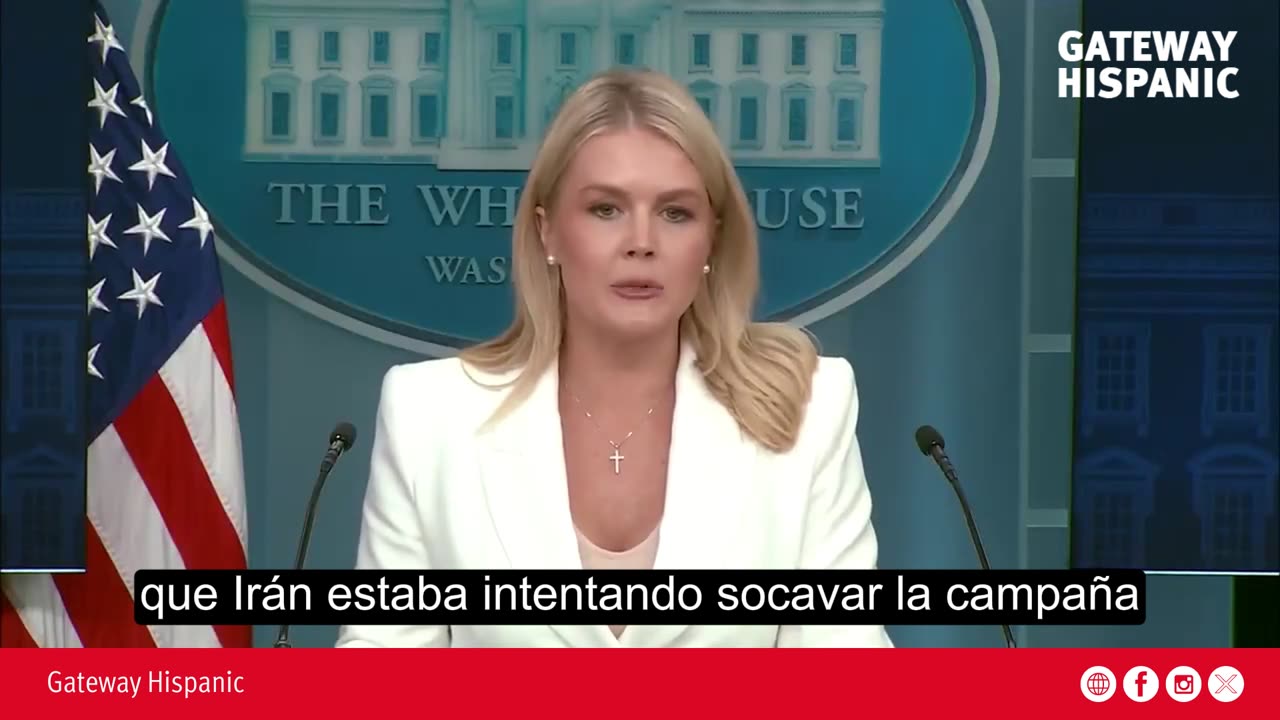Premium Only Content

Media Manipulation: Leaks Aimed at Hurting Trump
A new political and media storm has erupted in the heart of the U.S. capital. Karoline Leavitt, current White House Press Secretary under President Donald J. Trump, has publicly denounced an orchestrated disinformation campaign based on illegal leaks stemming from a low-confidence intelligence assessment. The accusations go beyond a mere critique of the media: they point directly at CNN journalist Natasha Bertrand, who has been involved in previous episodes of narrative manipulation with clear political motivations.
Targeted Leaks: A Weapon to Shape Public Opinion
According to Leavitt, what happened was neither a coincidence nor a journalistic error. It is part of a systematic pattern aimed at eroding public support for Trump using selective leaks as a political weapon. In this case, the details leaked to CNN came from a preliminary intelligence document, lacking confirmation or consensus within the intelligence community, and labeled as “low confidence”—indicating low reliability and corroboration.
“This wasn’t a full disclosure or a consensual assessment. Specific excerpts were selected to cast doubt on the legitimacy of a military operation and on President Trump’s leadership,” Leavitt warned.
The seriousness of the leak is such that, according to internal sources, the FBI has opened an investigation to identify and prosecute the responsible party. If it is proven to have been intentional and politically motivated, it could constitute a federal offense with serious legal consequences.
Natasha Bertrand: Repeat Offender and Narrative Accomplice
This is not the first controversial incident involving Bertrand. In 2020, the journalist was one of the main promoters of a letter signed by 51 former intelligence officials that falsely claimed Hunter Biden’s laptop contents were part of a Russian disinformation campaign. Years later, the FBI confirmed the files were legitimate, and that the narrative pushed by Bertrand was incorrect.
She also downplayed and discredited the lab-leak theory regarding the origin of COVID-19, claiming it had been dismissed by the intelligence community. Today, that same hypothesis is being taken seriously by multiple agencies and governments.
That’s not all. Bertrand has been accused of taking President Trump’s statements out of context, including the “very fine people” quote after Charlottesville and the false “suckers and losers” report about military veterans—both repeatedly debunked by multiple witnesses and independent reports.
“What Bertrand does isn’t journalism. It’s propaganda disguised as reporting. She’s become a useful tool for those seeking to misinform the public and weaken President Trump’s legitimate leadership,” Leavitt declared.
A Military Operation Tarnished by Opportunism
The leak came at a crucial moment: just days after U.S. forces completed a high-precision overseas operation, hailed by Pentagon experts as one of the most successful in recent history. The mission, carried out by elite fighter pilots, successfully neutralized a critical threat to national security.
However, instead of focusing on the operational success, CNN chose to cast doubt on the legality and justification of the mission. They used an unconfirmed assessment, omitted context, and created an artificial controversy to fuel a narrative of alleged abuse of power by the president.
“They’re smearing the honor of those who risk their lives for our freedom. This isn’t just an attack on Trump; it’s an attack on our armed forces,” said an indignant Leavitt.
The Role of the Media: Guardians of Truth or Tools of Power?
The question many conservatives and patriotic citizens are asking today is simple: Can the mainstream media be trusted? Given the facts, the answer seems to be no. Instead of acting as watchdogs of truth, many journalists have chosen to become ideological activists, shaping reality through omissions, exaggerations, and lies.
Bertrand does not act alone. She is part of a media ecosystem that includes figures and outlets with a long history of hostility toward President Trump. But what’s most alarming is that these actions affect not just a political figure but the institutional health of the republic.
Citizens deserve a free press—yes—but also a responsible and rigorous one. Using incomplete leaks to attack an administration is not journalism. It is covert activism.
Conclusion: A Battle for Truth in Times of Manipulation
Karoline Leavitt’s statement is not just a media positioning—it’s a warning about the real risks facing American democracy when the media allies itself with hostile factions inside the state apparatus. When intelligence becomes a political tool and journalists become ideological operatives, the most important thing is lost: the public’s trust.
Under the leadership of Donald J. Trump, the White House has made it clear that these manipulation campaigns will not be tolerated. Those responsible for illegal leaks will be held accountable, and honest reporting will be restored as the foundation of public debate.
“America’s enemies aren’t just outside our borders. They’re also within—disguised as experts and journalists. But we won’t let them win,” Leavitt concluded.
In times when facts matter more than narratives, the American people deserve to know the truth. And that truth is clear: President Trump is acting decisively to protect the country, while his detractors use every tool at their disposal to undermine his leadership. But the people are awake now. And they won’t be lulled back to sleep.
-
 LIVE
LIVE
Inverted World Live
4 hours agoThe Technocratic Web of Control w/ 7SEES | Ep. 142
2,284 watching -
 2:43:56
2:43:56
TimcastIRL
3 hours agoDemocrats COLLUDED With Epstein To HURT Trump, Emails BACKFIRE
182K58 -
 11:32:19
11:32:19
Dr Disrespect
12 hours ago🔴LIVE - DR DISRESPECT - ARC RAIDERS - STELLA MONTIS QUESTS
216K14 -
 5:20:41
5:20:41
SpartakusLIVE
6 hours agoSolos on WZ to Start then ARC?! || Friends: UNBANNED
22.8K -
 12:58
12:58
Cash Jordan
6 hours agoMexican MOB OVERTHROWS Capital... as "Socialist President" FLOODS AMERICA with CARTELS
3.8K3 -
 23:13
23:13
Jasmin Laine
8 hours agoPBO Breaks His Silence—“This Is Soviet Stuff”… and the Panel EXPLODES
3.21K12 -
 1:17:26
1:17:26
Jamie Kennedy
20 hours agoCatching Up With Deep Roy: JKX Stories, Star Wars Secrets, and Total Chaos | Ep 231 HTBITY
3.35K1 -
 1:28:42
1:28:42
ThisIsDeLaCruz
2 hours agoThe Secrets Behind Madonna’s Legendary Live Sound
15.4K6 -
 1:22:15
1:22:15
Glenn Greenwald
6 hours agoTrump and JD Vance Weigh in on the MAGA Civil War Over Tucker; Zelensky's Top Associates Embroiled in $100 Million Corruption Scandal; FBI's Ongoing Concealment About Trump Shooter | SYSTEM UPDATE #548
119K107 -

megimu32
3 hours agoON THE SUBJECT: 2000s Pop Punk & Emo Nostalgia — Why It Still Hits
18.7K3